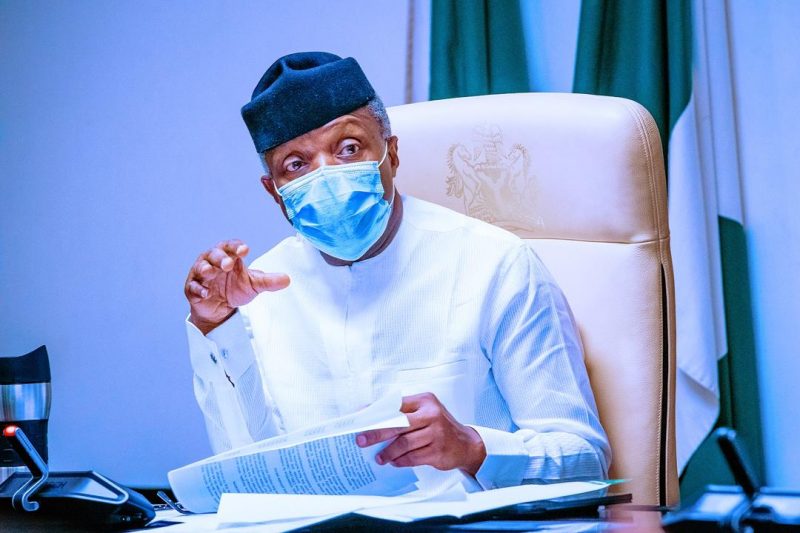Vice President Yemi Osinbajo says the Federal Government will ensure the completion of the critical projects it has embarked upon in the Niger Delta region.
Osinbajo’ spokesman, Laolu Akande, in a statement on Tuesday in Abuja said the vice president spoke at the 6th Anniversary Lecture/Niger Delta Awards Organised by Gbaramatu Voice Newspaper in Lagos.
The vice president was represented at the ceremony by the Senior Special Assistant to the President on Niger Delta Affairs, Office of the Vice President, Mr Edobor Iyamu.
Read Also: Northern Nigeria: UN establishes task force to address food insecurity
The theme of the event, “The Dwindling State of Crude Oil Demand in the Global Market: The Way Forward”.
“In 2017, following my tour of the Niger Delta, which involved extensive consultations with key stakeholders in the region, the new vision for the Niger Delta was birthed in response to the various challenges which had been plaguing our people.
“The objective of this new vision is to ensure that the people of the region benefit maximally from their wealth, through promoting infrastructural developments, environmental remediation and local content development.
“As part of the quest to expand economic opportunities in the region, this administration has promoted investments in modular refineries.
“The objective of this initiative is to address our present energy demands and empower the Niger Delta people through promoting local content.”
Osinbajo said that while there were several modular refineries at different stages of completion across the region, three had been completed including the Niger Delta Petroleum Resources (NDPR) Modular Refinery in Rivers; OPAC Modular Refinery in Delta and Walter Smith Modular Refinery in Imo.
He said the ongoing remediation exercise in Ogoni land, Rivers, was kick-started by the present administration under the recommendations of UNEP.
“It is important to note that the Ogoni clean-up is the first of its kind in the history of the Niger Delta.
” Indeed, this is the first time the Federal Government is directly involved in remediation activities within the region.
“We are equally committed to expanding infrastructure in the region, this includes the ongoing construction work on the 34-km Bonny-Bodo Road/Bridge, which has been abandoned for decades.
“When completed, the project, which was flagged off in October 2017, will connect several major communities and boost socio-economic development in the region.”
Osinbajo said that the Itakpe-Ajaokuta-Warri Rail Line project, which was commissioned by the president in September, and had the capacity to handle both passengers and freight services, was connecting several communities and promoting commerce within the region.
According to him, the Federal Government is also developing a number of deep sea ports across the region, including the Bonny, Warri, and Ibom Deep Sea Ports, among other development projects such as the establishment of Export Processing Zones to boost economic activities.
He said that in 2018, the National Universities Commission (NUC) approved the commencement of undergraduate degree programmes at the Nigerian Maritime University in Okerenkoko, Delta, which happened to be situated in the great Gbaramatu Kingdom.
“Beyond its oil wealth, the Niger Delta region is incredibly blessed with diverse human capital across education, sports, technology, creative arts, entertainment, economy, and many other sectors.”
The vice president said that factors such as the decline in demand for crude oil, the impact of the COVID-19 pandemic on global energy demand and on government’s earning, the current situation, required creative and holistic approach to foster economic growth.
He said that in spite of the fact that crude oil accounted for about 90 per cent of Nigeria’s foreign exchange earnings, the Federal Government from inception had shown a commitment toward the creation of economic opportunities for Nigeria’s population in a post-oil future.
The vice president highlighted initiatives being taken by the Federal Government to reposition Nigeria’s economy by taking advantage of global trends in the energy sector.
“This includes the SolarPowerNaija Programme under the Economic Sustainability Plan (ESP) which will complement efforts toward providing affordable electricity access to 5 million households, serving about 25 million Nigerians in rural areas and under-served urban communities nationwide,” he said.
The vice president also highlighted efforts by the Federal Government on energy transition from crude oil to natural gas, as well as its National Gas Expansion Programme, also a component under the ESP.
Osinbajo commended the publishers of Gbaramatu Voice Newspapers for organising the event.
According to him, the cumulative effect of all the measures will have a positive transformational impact on the Niger Delta and on the future of the nation as a whole, while ensuring sustainable peace and progress in the region.(NAN)

